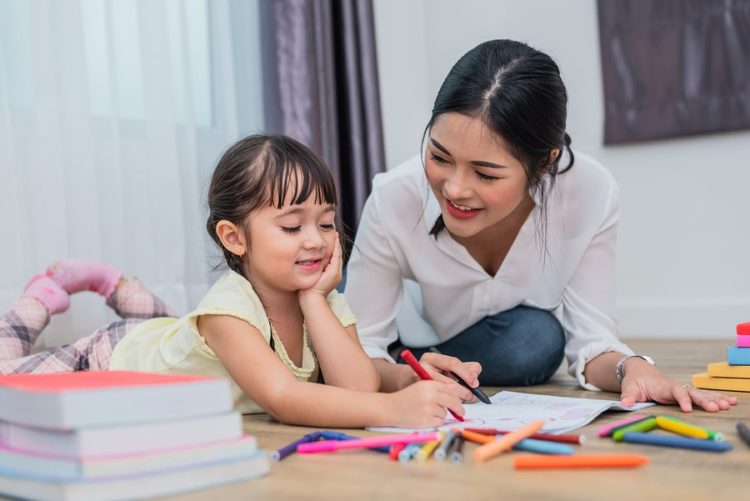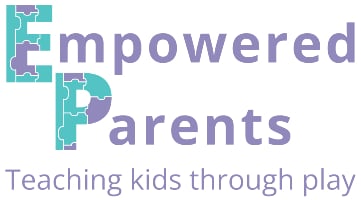All too often, we put the focus on our children’s intellectual and physical development, while their emotional and social development is just as important, if not more.
Children need emotional stability in order to feel happy and safe. It is also a prerequisite for learning.
Here are the basic emotional needs of children and 24 tips to ensure your children grow up to be emotionally well adjusted. They are all based on the fantastic book “Language and School Readiness”, written by Martie Pieterse.
6 Emotional Needs of a Child
What are the basic emotional needs of children? Here is a summary.
1. Safety and Security
Children need to feel secure and safe in order to thrive and develop emotionally.
Tiny babies are completely dependent on their parents but need to be able to explore their surroundings to learn. When they feel loved and safe, they find the courage to start discovering the world and this is how they grow and learn.
Young children also learn best when their family and home life are predictable and safe.
2. Routine
Children who have daily routines feel more secure because their days are predictable. They find it comforting to know what to expect in a day. Their routines for sleeping, eating, bathing and other activities give their day structure.
If there was no predictability to the day they would easily become overwhelmed and unsettled, and home would not feel like a safe haven.
Children who follow routines at home also settle much easier into school routines.

3. Discipline and Consistency
Children need discipline in order to learn about socially acceptable behaviour and norms. They need to learn how to live respectfully amongst others.
The more they learn to navigate the world appropriately, the better their sense of self-confidence and motivation. They also form better friendships and relationships.
Discipline should be fair and consistent, so your children always know what is expected of them and what their limits are. Inconsistent or harsh disciplinary styles do not result in children who learn self-control and self-discipline, as they are fear based.
Children need time to learn about being accountable for their actions and how their actions result in consequences. A fair and calm style of discipline in the home will aid this process.
4. Love
Unconditional love and a strong bond with parents are absolutely vital for a good foundation in life. Feeling loved is the most important emotional need of a child.
Children need lots of hugs and kisses and they also need to be told that they are loved. This gives them emotional security.
5. Uniqueness
In order to reach their full potential, children must be allowed to be themselves. They need a relaxed and safe environment within which to develop their own talents and aptitudes and become people in their own right.
Don’t underestimate them, but don’t push them unrealistically towards your own vision for them either.
6. Acceptance, Recognition and Approval
When children receive unconditional love it shows them that they are accepted as they are. This builds their self-confidence which is the best gift you can give a child for their journey through school.
Acceptance and approval should never be conditional if your child is to learn to feel worthy. This should be automatic and not related to how they behave.
Learn to praise your children constructively and recognize their actions and efforts. This becomes a strong motivator for them.

Why Is It Important to Develop Emotional Skills?
Children who have well-developed emotional skills have:
- Better health
- Less stress
- Better relationships with friends
- Better behaviour
- A positive attitude
- Less conflict with siblings and parents
- More self-confidence
- Better results at school
- More motivation
- Self-acceptance
- Good communication skills
- The ability to make decisions
- Less influence from peer pressure
24 Tips for Raising Emotionally Healthy Children
So, how do you raise children with emotional maturity and intelligence? Here’s how to meet your children’s emotional needs with some simple, actionable tips.
Accept Your Child Unconditionally
The most important factor in a child’s emotional development is unconditional love and acceptance. This is important for a child’s sense of identity and will impact all future relationships.
Be Affectionate
Children need lots of physical contact. A baby’s brain growth is greatly affected by how much physical contact he receives. It is as important as physical needs such as being fed and cleaned.
Show affection often and remember to show your spouse affection too. Modelling a healthy relationship is important as it also will impact your child’s future relationships.

Talk to Your Child Often
Talk to your children at every opportunity in a calm, loving voice. Talking is one of the best ways of connecting, along with physical affection.
Listen
Don’t forget to listen to your children. Really listen. We are living in a very distracted society where we do everything on the run. Make sure you take the time to stop, listen to what your child is saying and respond.
Your children can pick up when you are only half-listening to them.
Create a Peaceful Atmosphere at Home
Your home should be organized and peaceful. This creates a healthy environment conducive to learning through exploring and discovering.
A safe and calm environment also gives children a sense of security.
Create a Safe Environment
Your home should also be a physically safe place in which to explore without any danger.
Valuables and breakables should not be within reach and potentially dangerous objects should be put away.
In an unsafe environment, parents have to constantly stop their children from exploring. Hearing “don’t go there,” and “don’t touch that” too often does not create a feeling that it’s safe to learn freely.
Allow Lots of Time for Play
Play is the way children learn and it is while they are playing that they develop emotional maturity.
There are many emotional benefits of play.
Certain types of play, such as fantasy or symbolic play, are a great way for your child to express how he feels about the world and act out various adult situations. During play he can become anyone and pretend to be an adult, coping with situations and emotions.
Other types of play such as water play, sand play or playing with playdough are great tension relievers.
Be Available
When your children need you, make an effort to stop what you are doing and be available. Your time with your little ones is limited and shouldn’t be spent in distracted mode. Make a special effort to not be on your phone during the time you spend together.
We often place the emphasis on taking care of a child’s physical needs but being emotionally available for a child is just as important.

Make Time
Over and above being available when you are with your children, it’s also important to make time during your busy schedule to spend time together.
Time is limited but it will always be split between the things you prioritize most. Other things may fall behind and not get done but time with your children is an investment and is a fleeting period you’ll never get back if you don’t make the most of it.
Supervise Play
Children up to the age of preschool need to be supervised by an adult during play. Even though older children are able to play cooperatively, they still need the presence of an adult nearby or they will feel unsettled.
This helps them feel safe and secure to continue playing as they know there is someone to help if necessary.
Keep Your Promises
Children learn very quickly whether they can trust an adult or not. It is vital to always keep the promises you make to them.
A positive relationship between parent and child can only be formed on mutual trust. This also teaches them to form trusting relationships with others throughout their lives.
Encourage Sharing of Emotions
Teach your children to openly share their emotions. Have frequent discussions about how they are feeling or how they feel after a particular experience, such as a conflict with a friend or losing a pet.
Teach your children that boys and girls experience the same emotions and never discourage an emotion based on gender.
Introduce fun feelings activities that explore different emotions.
Allow Your Child to Experience All Emotions
It is also important that your children are allowed to experience the full array of emotions – good and bad. You may want to protect them from feeling upset or disappointed by sorting out their problems for them or intervening too often but this will not benefit them in the long run.
When your children are independent they must be able to deal with their emotions and not let a small disappointment, such as not winning a race in school, become a crippling event.
Teach Your Child to Make Choices
Children must learn to make choices from an early age. At first, this can be practised with simple daily decisions such as what to wear, what game to play or what to eat.
When they make decisions they learn about accepting the consequences of those decisions.
Show an Interest
Show an interest in what your children are doing and recognize their efforts. When children perform simple tasks and are acknowledged for them, they develop a sense of responsibility and this leads to self-motivation.

Encourage Physical Activities
Physical activities are a great way to manage emotions and also an outlet for tension. Encourage your children to engage in lots of physical free play outdoors, as well as sports activities when they are older.
Teach Independence
Independence is the end goal of good parenting. What other job do you have that is more important than guiding your children so that they will be happy and functional adults?
You can teach kids independence from an early age. Always allow your children to do the things they are able to do themselves.
Provide Discipline
Children who have consistent and fair discipline at home feel more secure than those who are not aware of their boundaries.
Children need to learn values and norms and behaviour that is acceptable in society.
Discipline should be fair, not extreme or done in anger, and most importantly – applied consistently. This leads to children developing self-discipline in time.
Always point out the behaviour that is inappropriate and don’t make discipline a personal attack on your child.
The best discipline expert, in my opinion, is Janet Lansbury.
Laugh a Lot
Children naturally want to laugh and be happy. Tiny babies start smiling after just a few weeks and start giggling soon after that.
Laughter is one of the joys of life and can make any situation lighter and more bearable.
Make laughter a daily staple in your home. Laugh together all the time, play with words and make silly jokes. It will become one of their best coping skills.

Be an Example
Just like any other skill, the best way to teach it is to model it. In order to develop good emotional skills, children should have emotionally intelligent parents.
If you are frequently losing your temper, speaking badly about your family or friends, or never expressing your own emotions, it will be difficult to expect your children to behave maturely.
Encourage Independent Problem Solving
Problem solving is a crucial skill for survival on the playground, in the classroom, in the workplace and in life.
The best time to solve problems is during play. Let your children find solutions to the challenges they encounter while playing, as well as resolve small conflicts.
Try not to plan playdates and let them find creative ways to entertain their friends.
Encourage Fantasy Play
Fantasy play – also called make-believe, pretend, dress-up or symbolic play – is a type of play where children step into other roles, become something else, act out various scenarios such as being adults.
It is through this type of play that children express their emotions and act out how they see the world. They learn to deal with their daily experiences by taking on a role and finding grown-up solutions.
Fantasy play is excellent for emotional development and should be encouraged often.
Teach Gratitude
Gratitude is a really wonderful quality to have. Teach your children not to take their life and comforts for granted but rather to become aware of what they are thankful for.
Make regular habits such as saying one thing you are grateful for at the dinner table, and occasionally encourage your child to donate some toys or books to the less privileged.
Teach Please, Thank You and Sorry
Having manners is one of the best life skills to learn. Please, thank you and sorry are words that should be used frequently in your home.
Teach your children to speak respectfully to waiters, cashiers and others in service, family members, friends and strangers. Even babies can start to learn simple manners such as please and thank you from very early on.
I hope these tips have helped with understanding the emotional needs of a child.
Here are some great social-emotional activities for preschoolers and also an explanation of the milestones and stages of emotional development.


San Ei Nwe
Sunday 30th of October 2022
Thank you very much for your description.
Tanja Mcilroy
Monday 31st of October 2022
You're welcome!